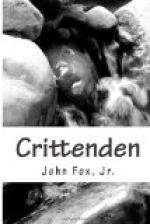Looking toward Caney he could even see the hill from which he had witnessed the flight of the first shell that had been the storm centre of the hurricane of death that had swept all through the white, cloudless day. It burst harmlessly—that shell—and meant no more than a signal to fire to the soldiers closing in on Caney, the Cubans lurking around a block-house at a safe artillery distance in the woods and to the impatient battery before San Juan. Retrospectively now, it meant the death-knell of brave men, the quick cry and long groaning of the wounded, the pained breathing of sick and fever-stricken, the quickened heart-beats of the waiting and anxious at home—the low sobbing of the women to whom fatal news came. It meant Cervera’s gallant dash, Sampson and Schley’s great victory, the fall of Santiago; freedom for Cuba, a quieter sleep for the Maine dead, and peace with Spain. Once more, as he rose, he looked at the dark woods, the dead-haunted jungles which the moon was draping with a more than mortal beauty, and he knew that in them, as in the long grass of the orchard-like valley below him, comrade was looking for dead comrade. And among the searchers was the faithful Bob, looking for his Old Captain, Crittenden, his honest heart nigh to bursting, for already he had found Raincrow torn with a shell and he had borne a body back to the horror-haunted little hospital under the creek bank at the Bloody Ford—a body from which the head hung over his shoulder—limp, with a bullet-hole through the neck—the body of his Young Captain, Basil.
XII
Grafton sat, sobered and saddened, where he was awhile. The moon swung upward white and peaceful, toward mild-eyed stars. Crickets chirped in the grass around him, and nature’s low night-music started in the wood and the valley below, as though the earth had never known the hell of fire and human passion that had rocked it through that day. Was there so much difference between the creatures of the earth and the creatures of his own proud estate? Had they not both been on the same brute level that day? And, save for the wounded and the men who had comrades wounded and dead, were not the unharmed as careless, almost as indifferent as cricket and tree-toad to the tragedies of their sphere? Had there been any inner change in any man who had fought that day that was not for the worse? Would he himself get normal again, he wondered? Was there one sensitive soul who fully realized the horror of that day? If so, he would better have been at home. The one fact that stood above every thought that had come to him that day was the utter, the startling insignificance of death. Could that mean much more than a startlingly sudden lowering of the estimate put upon human life? Across the hollow behind him and from a tall palm over the Spanish trenches, rose, loud and clear, the night-song of a mocking-bird. Over there the little




